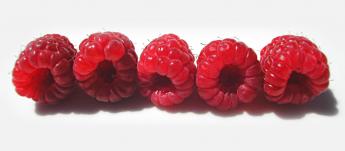|
Whole Foods Synergy March 6, 2000. WASHINGTON, DC -- Concerned that the public may be misled by recent reports showing that isolated nutrients do not provide cancer protection, the American Institute for Cancer Research (AICR) today stressed the interactive nature of cancer-fighting substances in fruits, vegetables, whole grains and beans. The vitamins, minerals and phytochemicals found in these foods work together in complex ways to fight cancer, researchers said. Full Story |
||||||
|
Plant Compounds Slow Growth of Tumor CellsApril 6, 1999 Two compounds from edible plants suppress growth of three kinds of human cancer cells, UW-Madison researchers report. Their findings "strengthen the idea that a diet rich in plants is beneficial because of the large array of plant compounds rather than the singular action of one kind of plant or one compound in plants." Full story |
Fruit and Vegetables in Diet Help Prevent Osteoporosis In Men April 2, 1999. A new look at lifetime diets of participants in the Framington Heart Study found that for both men and women, lifelong dietary intake of potassium, magnesium and fruits and vegetables affected bone strength in old age. Full story |
||||||
|
White Tea May Have Even More Potent Anti-Cancer Effect April 13 2000. White tea, known mostly to tea connoisseurs, may have the strongest potential of all teas for fighting cancer, according to Oregon State University researchers. Full story |
Cow's Milk and Dairy Foods as Risk for Prostate Cancer Harvard researchers cautiously warn that high dairy consumption puts men at higher risk for prostate cancer and for metastastic spread. Full story |
| Citrus Fights Cancer April 6, 1999 Citrus limonoides, found in orange peel and other citrus rinds, could have significant health benefits, scientists said last month at the American Chemical Society conference. The active compound may have anti-cancer effects. Citrus limonoids are present in commercial orange juice at about the same level as vitamin C. A Japanese company is producing an orange juice with triple the level of limonoid glucosides. Full story |
Grapefruit Affects Chemo Meds Red grapefruits are high in lycopene, making them a good anti-prostate cancer diet snack. But whatever their color, grapefruit can affect the body's absorption of many medications. Although some drugs are absorbed faster if taken with grapefruit juice, a new study finds that the "grapefruit effect" can block Vinblastine, a drug used in chemotherapy for treating prostate cancer. Full story |
|
|
|

 PSA
Rising, September 25 , 2003. Gorging on foods in season is
how hunter-gatherers survived. Today our hunter gatherers include rows
and rows of lab technicians testing panels of plant compounds. Boil
down raspberries, grapeskins, broccoli or tomatos, extract the
"active" compound, test in dishes and on tumors implanted
in mice, pick the good ones, pack the extracts in gelcap capsules and
sell with small print disclaimer. Important as it is to know about potent
nutrients extracted from foods, people trying to prevent or slow
down progression of serious diseases such as cancer need to remember
to eat well too. We still want to enjoy our food. As obesity rates soar,
we all need to relearn food wisdom and teach our children and grandchildren
how to choose and prepare good food and how to eat well. Evidence keeps
coming in to confirm the superiority of a diet rich in a broad array
of plant foods -- fruits and vegetables in season.
PSA
Rising, September 25 , 2003. Gorging on foods in season is
how hunter-gatherers survived. Today our hunter gatherers include rows
and rows of lab technicians testing panels of plant compounds. Boil
down raspberries, grapeskins, broccoli or tomatos, extract the
"active" compound, test in dishes and on tumors implanted
in mice, pick the good ones, pack the extracts in gelcap capsules and
sell with small print disclaimer. Important as it is to know about potent
nutrients extracted from foods, people trying to prevent or slow
down progression of serious diseases such as cancer need to remember
to eat well too. We still want to enjoy our food. As obesity rates soar,
we all need to relearn food wisdom and teach our children and grandchildren
how to choose and prepare good food and how to eat well. Evidence keeps
coming in to confirm the superiority of a diet rich in a broad array
of plant foods -- fruits and vegetables in season. 
